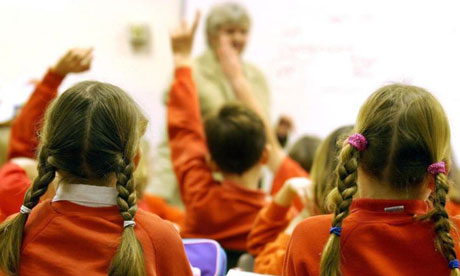
Primary schools could be told to scrap some traditional subject-based lessons and replace them with "personal development" classes to encourage children to improve their social and practical skills.
Parents, teachers and pupils, who took part in an in-depth consultation that feeds into the biggest ever official review of the primary curriculum, argued that the number of subjects taught to very young people should be reduced.
The subjects most likely to be culled might include history, geography, design and technology, and RE.
The review, being conducted by the government's schools' guru Sir Jim Rose, will consider how to redesign the primary school day to tackle concerns that too many pupils leave primary school unable to read, write and do maths at the level expected of them.
It will also address criticisms that pupils are expected to study so many subjects there is little time for creative learning and play for very young children.
The 60 focus groups brought together 1,500 parents, pupils and school staff and is expected to heavily influence the thinking of the Rose review, which the government is promising to back. An interim report is due next month.
Instead of a broad range of subjects, pupils should study in-depth literacy and numeracy lessons alongside a more creative curriculum that encourages pupils to develop personal, learning and thinking skills, they say in a report of the focus groups published this week.
Such lessons might include "healthy lifestyles, sex and relationships education, drugs and alcohol education, philosophy, self-esteem and helping children to understand multiple cultural identities", the document says.
There was an "almost unanimous" opinion that reading and writing would improve if schools focused more on speaking and listening skills, it says.
The report suggests that the final review should recommend that the curriculum focuses less on subject matter and more on helping pupils developing understanding of concepts and skills.
John Bangs, head of education at the National Union of Teachers, said: "Child and personal development as priorities have been shamefully neglected in recent years in the rush to hit targets in the basics.
"We are all social beings and steps to that need to learned at home and in school.
"However space and time has to be made for working with children. The worst thing would be to evaluate child development through the meat-grinder of the current high stakes testing system. That would undermine the capacity of teachers to meet children's unique needs."
The shadow schools minister, Nick Gibb, said: "If the primary curriculum is watered down so lessons on lifestyle are given the same status as traditional subjects it is the most disadvantaged children who will be worst affected.
"Children are not able to personally develop and succeed in the future if they don't have a grasp of basic subjects such as maths and English early on in primary school.
"Removing rigour from the primary curriculum would increase the inequality gap between less well-off pupils and the rest."
A spokeswoman for the Department for Children, Schools and Families (DCSF) said: "This is a summary of stakeholders' views, not the views of the Qualifications and Curriculum Authority or the DCSF, and has been submitted to Sir Jim Rose's review as evidence to consider."

